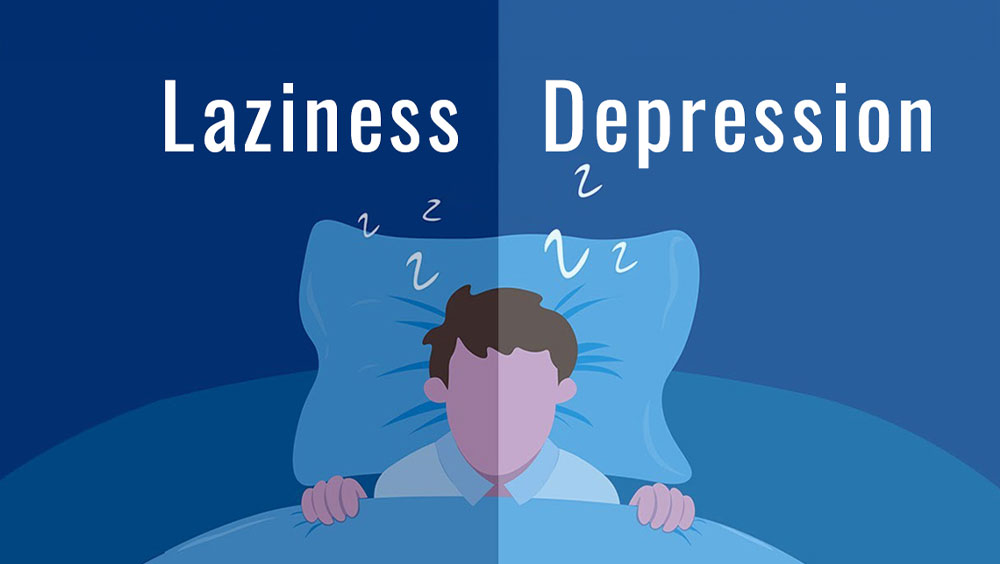In today's fast-paced world, it's all too common to label oneself or others as "lazy" when productivity levels falter. Yet, beneath what appears to be a simple lack of motivation may lie deeper, less visible struggles, such as depression. Recognizing the subtle but significant differences between laziness and depression is essential for addressing these issues with empathy and understanding. By delving into the complexities that differentiate these two states, we can gain valuable insights and take informed, compassionate actions to support ourselves or others in navigating these challenges.
Understanding Laziness

Laziness, often perceived as an inherent trait, is more accurately a learned habit that can be reshaped with intentional effort and mindset shifts. At its core, laziness is not about incapacity; it's about finding the motivating spark that ignites action. This inertia can generally be broken by identifying compelling incentives—whether they be personal goals, external deadlines, or rewards. While temporary bouts of laziness may surface amidst periods of low motivation, they can serve as indicators of underlying disinterest or misalignment with one's values and passions. By reframing tasks to align with personal interests or by cultivating a structured routine, individuals can effectively combat tendencies toward procrastination. In this light, overcoming laziness becomes a journey of self-discovery, highlighting the need for personal accountability and proactive engagement with tasks at hand..
What Is Depression?

Depression extends beyond just emotional symptoms; it brings about a cascade of physical, cognitive, and social challenges that further complicate an individual's daily life. Those experiencing depression often grapple with overwhelming fatigue, disrupted sleep patterns, and changes in appetite. Additionally, it can cloud one's ability to concentrate, remember details, and make decisions, creating a barrier to maintaining productivity and fulfilling responsibilities. Socially, individuals with depression might withdraw from friends and family, feeling isolated and misunderstood, which can intensify feelings of loneliness and despair. This mental health disorder doesn't merely affect the person enduring it but also resonates through their connections, impacting relationships and support systems. Addressing depression requires comprehensive care that encompasses therapy, medication, lifestyle changes, and a compassionate understanding from society to foster a supportive environment for healing..
Lazy Or Depressed: The Key Differences

When pondering the question, "Am I lazy or depressed?" it's essential to delve into the nuanced differences between the two. Laziness often manifests as a temporary lack of motivation in specific scenarios, frequently resolving itself when an engaging or rewarding incentive appears. It's more akin to a fleeting disinterest in certain activities rather than an all-encompassing apathy. In contrast, depression seeps into every corner of an individual’s life, casting a shadow over activities once enjoyed and sapping energy and enthusiasm universally. It is an indiscriminate force, impacting relationships, work, and self-care. Unlike laziness, depression is accompanied by profound feelings of worthlessness, guilt, and despair that persist despite external circumstances or attempts at motivation. Understanding these distinctions can guide one towards seeking the appropriate support or strategies for improvement, whether it involves shaking off a momentary slump or reaching out for professional help for deeper emotional distress..
Motivation And Behavior

This distinction between laziness and depression highlights the nuanced nature of human motivation. A person deemed lazy might shirk responsibilities around the home yet exhibit zeal for hobbies or social activities, suggesting selective engagement rooted in personal preference rather than an absence of motivation. On the other hand, someone grappling with depression may struggle to find joy or motivation in any area of life, indicating a pervasive influence on their emotional and mental state. Understanding this difference requires a compassionate and patient approach, recognizing that what appears as disinterest may be an individual grappling with deeper emotional challenges. By observing behavior patterns over a period and considering the broader context, we can offer more targeted support and encourage discussions that help differentiate between these conditions, ultimately fostering environments that promote well-being and understanding..
The Role Of Physical Symptoms

In addition to these physical symptoms, depression can also affect cognitive functions, leading to difficulties in concentration and decision-making. These cognitive impairments can create a feedback loop, where the loss of focus and clarity further diminishes motivation and productivity, deepening the sense of despair. Unlike temporary periods of laziness, which are often interspersed with bursts of energy and initiative, depression casts a persistent shadow over one's daily activities. This pervasive impact extends beyond just reduced physical energy; it also affects emotional well-being, manifesting as persistent feelings of worthlessness and hopelessness. By understanding these nuances, friends, family, and mental health professionals can offer more targeted support, ensuring that those suffering from depression receive appropriate care rather than judgment, which is crucial for their recovery journey. Recognizing the comprehensive nature of depression is key to differentiating it from laziness and facilitating a compassionate approach to mental health..
Emotional Impact And Self-Perception

Emotionally, the distinction between laziness and depression becomes apparent through the long-term impact on one's self-perception and emotional well-being. While temporary bouts of laziness may culminate in guilt or frustration due to procrastination and unmet goals, they seldom lead to enduring damage to one's self-esteem. In contrast, depression casts a more insidious shadow, often warping self-perception and eroding self-worth over time. Those trapped in the depths of depression frequently grapple with pervasive feelings of worthlessness and overwhelming guilt, which eclipse any transient frustrations associated with laziness. This profound emotional turmoil, marked by constant self-criticism and despair, highlights the stark difference between the two states. Understanding this difference is crucial, as it underscores the need for compassionate intervention and support for those battling depression, rather than dismissing their experience as mere lethargy or lack of motivation..
Seeking Professional Help

Navigating the complexities between laziness and depression can be challenging without the assistance of a trained mental health professional. It's important to remember that what might seem like mere procrastination or lack of motivation could be indicative of a deeper issue requiring attention. By consulting with a professional, you can gain a deeper understanding of your mental state through comprehensive assessments. These experts can differentiate between typical laziness, which can often be remedied with lifestyle adjustments, and depression, which may necessitate more structured intervention. Moreover, they can tailor strategies and therapeutic approaches that are specifically designed to address and alleviate your symptoms, empowering you to move forward with a clearer mind and renewed energy. Seeking help is a proactive step towards mental wellness, providing you the tools to navigate your own experiences with greater confidence and resilience..
Self-Help Strategies And Support Systems

Regardless of whether someone is lazy or depressed, self-help strategies and strong support systems can prove beneficial. While laziness might stem from a lack of motivation and temporary disinterest, depression often involves deeper emotional and psychological challenges. Hence, setting small, achievable goals becomes essential in both scenarios, as it provides individuals with a sense of accomplishment and progress. Maintaining a structured routine helps to instill a sense of normalcy and order, which can be particularly stabilizing for those battling depression. Additionally, seeking support from friends and family can offer encouragement and an opportunity to share experiences, reducing feelings of isolation. It's vital to acknowledge that for those with depression, these self-help strategies should complement professional treatment, such as therapy or medication, to ensure the most effective pathway to recovery. By integrating these approaches, individuals can create a supportive environment that fosters resilience and a gradual improvement in well-being..
In conclusion, distinguishing between laziness and depression is crucial for fostering genuine mental health and wellness. This discernment empowers individuals to take actionable steps toward their well-being by addressing the root of their inactivity or lack of motivation. By recognizing when professional intervention is necessary—as in the case of depression—versus when a simple motivational boost might suffice, individuals can more accurately navigate their emotional landscapes and seek out the appropriate resources. Ultimately, this nuanced understanding not only promotes personal growth but also facilitates a supportive environment where mental health is prioritized, paving the way for sustainable recovery and fulfillment.


